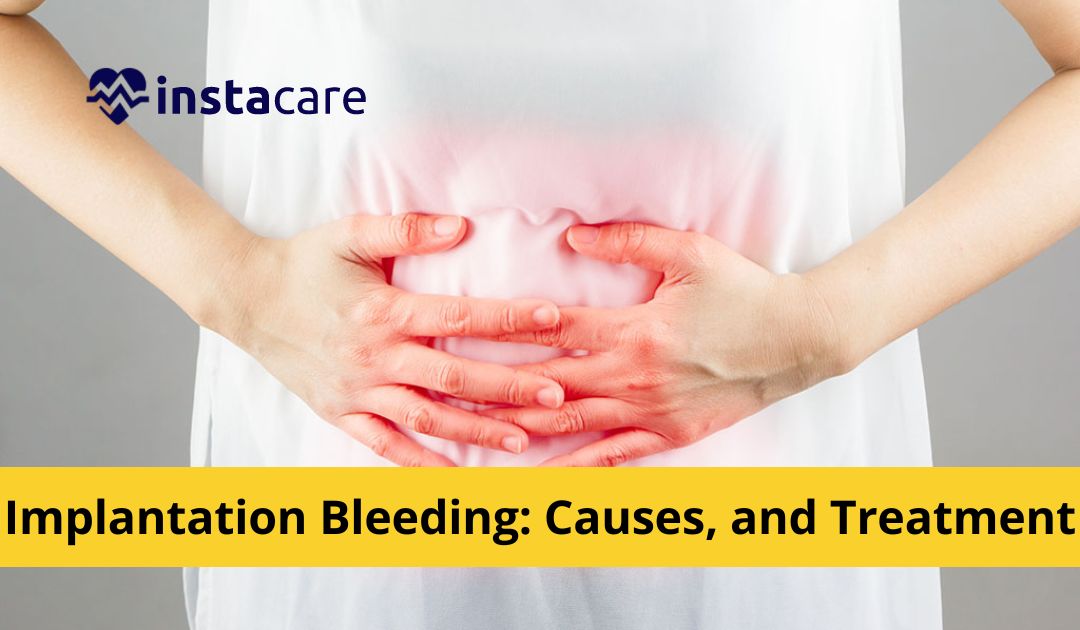Implantation bleeding is a common symptom of early pregnancy, and although it may seem alarming at first, many women find that understanding the causes, symptoms, and treatments helps them to feel more in control.
From spotting or light staining to heavier flow lasting a few days or up to one week - implantation bleeding can differ widely in appearance. If you’re experiencing this type of early pregnancy sign but aren’t sure what it means for you – read on! We’ll discuss the different factors that could be causing your implantation bleeding as well as how to respond appropriately for maximum health benefits.
What is implantation bleeding?
Implantation bleeding is a type of light spotting or bleeding that can sometimes occur when a fertilized embryo attaches to the lining of the uterus during pregnancy. It usually happens about six to twelve days after successful conception and implantation, which is why it is often confused as an early sign of pregnancy. Implantation bleeding typically has a short duration and is much lighter than a menstrual period, being either pink or brown in color.
Although everyone's experience with the symptom will be different, it is important to note that experiencing implantation bleeding does not necessarily mean that one is pregnant, as similar symptoms can also arise due to other causes such as hormonal fluctuations or cervical irritation. If you think you are experiencing implantation bleeding its best to check in with your doctor for a professional opinion.
When does implantation bleeding happen?
Implantation bleeding is a fairly common occurrence that happens around when an embryo begins to implant itself in the uterine wall. Generally speaking, implantation bleeding is lighter in color than a typical menstrual cycle, and it often occurs one to two weeks prior to when your period typically starts. It can appear as pink or brown spotting that usually lasts for only a few hours, but can last for up to three days.
The color of the blood rather than the amount indicates that this is usually not an issue for concern. Additionally, implantation bleeding does not present with any other symptoms such as cramping like a normal menstrual bleed does. Ultimately, if what you’re experiencing seems unusual or continues for longer than three days, then consulting your doctor or healthcare provider would be best.
Implantation bleeding symptoms
Implantation bleeding is a light spotting or discharge that occurs when the implanted fertilized egg first embeds itself in the uterine wall. This typically happens 6-12 days after ovulation, but can determine the exact timing varies based on individual women. Implantation bleeding is usually much lighter than normal menstruation and is sometimes pinkish, brownish, or dark red in hue.
It may be accompanied by other early pregnancy signs such as discomfort in the lower abdomen, fatigue, changes to breast tissue, implantation cramping, nausea, heightened sense of smell and taste, or an increased need to urinate. It's important to keep in mind that every woman's body is different and implantation bleeding may not always occur it only happens in 25-30% of pregnancies.
View More: Pregnancy Stretch Marks Causes Prevention Treatment
Causes of implantation bleeding
Implantation bleeding is a phenomenon that occurs during early pregnancy. This type of bleeding is light and different from menstrual flow, although it may look similar. Implantation bleeding is caused by the fertilized egg attaching itself to the walls of a woman’s uterus. Implantation typically occurs around 6-12 days after sexual intercourse took place and, as such, many women will mistake it for their period or have difficulty recognizing it altogether.
Causes of implantation bleeding are varied but often related to an excess amount of hormones being secreted at once which can cause spotting prior to the start of a pregnancy. Alternatively, this type of spotting may occur due to something as simple as body changes which happen in response to any sort of activity or exercise. The best way to determine if your bleeding is actually implantation bleeding is to first calculate your ovulation date, then monitor any signs that appear between 6 and 12 days after this date.
How long does implantation bleeding last?
Implantation bleeding is a relatively short-lived event, typically lasting only a couple of days. It generally starts off as light spotting that progresses to a light/medium flow where it can last anywhere from a few hours to a couple of days.
It is also important to note that implantation bleeding should not last longer than a week, given it isn't associated with any serious medical issues. If the duration and intensity of your period seem out of the ordinary or if the bleeding does not stop after 7 days, it is best to reach out to your doctor for advice or further monitoring.
When does implantation bleeding occur?
Implantation bleeding occurs when a fertilized egg attaches itself to the lining of the uterus, typically 8-10 days after ovulation. It can occur anytime from 6-12 days after the egg and sperm have met, so it often happens around the time you would normally expect your period.
While implantation spotting is generally quite light and might not even be noticed, it can also be heavier than a regular period. If you think you have experienced implantation bleeding because of unusual symptoms such as lower abdominal cramping or frequent urination, it is important to take a pregnancy test to confirm if these changes are related to pregnancy.
What does implantation bleeding look like?
Implantation bleeding is a type of light spotting that can occur during early pregnancy. It usually only lasts for a few minutes to a few days and can appear around the time when your period is due. It has been described as similar in appearance to a pink or rusty colored stain on the underwear.
Implantation bleeding, while light and not like the typical normal menstrual period, is typically more than spotting and will contain some level of flow. Because it occurs early in pregnancy, it sometimes is mistaken with the start of a normal menstrual period, so consulting your doctor beforehand will help confirm if you are pregnant or just experiencing implantation bleeding.
View More: 10 Early Signs of Pregnancy You Must Know
Implantation bleeding treatment
Implantation bleeding occurs when an embryo implants itself into the uterine lining and is a normal part of the pregnancy process. It usually takes place 6-12 days after conception, typically before a woman would miss her period. Some women may experience no implantation bleeding at all, but for those who do, treatment is simple and straightforward.
Many women find that over-the-counter pain medications can help alleviate any cramping associated with implantation bleeding and should be taken as indicated on the packaging or via their doctor's direction. If there's any sign of heavy bleeding, medical attention should be sought right away. Additionally, it can be helpful to keep track of dates if this type of bleeding persists since that can give healthcare professionals more insight into its cause.
Causes of bleeding during pregnancy
Pregnancy is a time of much joy and anticipation, but there can also be some very worrisome moments. One common concern for expectant mothers is bleeding during pregnancy. This can occur in any trimester, and can sometimes be caused by something as simple as sex or a cervical exam, however it can also be a sign of something more serious such as an ectopic pregnancy or miscarriage.
In some cases spotting could signify placenta previa, low lying placenta, or polyps on the cervix. Regardless of the cause, women should reach out to their doctor to ensure that all is well with the baby.
How can you prevent implantation bleeding?
Implantation bleeding is a light spotting that many women experience around 10-14 days after they ovulate. While this is quite common and nothing to worry about, there are certain steps women can take to minimize their potential for experiencing it. Women who do experience implantation bleeding should consider limiting their physical activity, ensuring adequate hydration and nutrition, and managing stress levels.
Eating a healthy diet full of fruits, vegetables, and whole grains can also help lessen the likelihood of implantation bleeding. Furthermore, limiting alcohol consumption has been found to reduce women's chances of experiencing abnormal levels of bleeding in general. Taking these simple steps can not only potentially prevent implantation bleeding but also promote overall health and wellbeing.
Conclusion
All in all, implantation bleeding is a normal process that can happen to many women on their reproductive journey. It is important to note that while it is normal, if your bleeding persists or becomes more severe and is accompanied by any other more extreme symptoms like fever or nausea, be sure to contact your doctor immediately. In general, there are many potential causes for implantation bleeding and the best way to determine what course of treatment you should take is to speak with a professional about your individual situation.
Additionally, though implantation bleeding usually resolves without incident and not harm the fetus in any way, it’s nevertheless important to stay as healthy as possible throughout pregnancy in order to ensure both you and baby are safe and well. Ultimately, while it can be unnerving to encounter any type of unexpected bleeding during pregnancy, if you experience implantation bleeding in the very early weeks don’t panic: it’s quite common and usually nothing to be concerned about!
Please book an appointment with the best Gynecologist in Lahore, Karachi, Islamabad, and all major cities of Pakistan through InstaCare, or call our helpline at 03171777509 to find the verified doctor for your disease.












